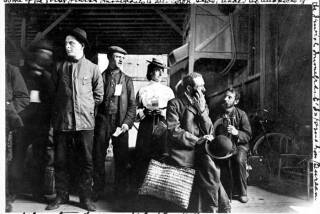Nightmare Puts an End to Dreams
- Share via
Walter Benjamin was one of the oblique victims of the Holocaust. Born and raised in Berlin, he spent 10 years in Paris at work on his magnum opus of cultural theory, then fled the invading German army with manuscript in hand but found himself trapped in fascist Spain, where he died by his hand.
“There is no such thing as history, you see,” the young Benjamin is imagined to say at one acutely ironic moment in Jay Parini’s biographical novel, “Benjamin’s Crossing.” “It’s a dream, perhaps even a dream of a dream.”
“Benjamin’s Crossing,” in a real sense, is Parini’s dream of the real-life Benjamin. The distinguished poet, novelist and biographer rescues Benjamin from obscurity, celebrates his intellectual achievements, ponders his passions and eccentricities, and mourns his passing. As re-imagined by Parini, Benjamin’s life story becomes a vivid metaphor for the apocalypse that ravaged the civilized world in the mid-20th century and cost the lives of countless millions of men, women and children, Benjamin among them.
“Benjamin was curiously out of touch with reality, especially when it came to politics and women,” we are told (and we come to see for ourselves). “His ignorance of the former is what killed him in the end; the latter just made his life miserable.”
*
The first voice we hear in “Benjamin’s Crossing” belongs to Gershom Scholem, the distinguished scholar of Jewish mysticism and a lifelong friend of Benjamin’s whose own refuge from Nazism was the Jewish homeland in Palestine. Parini uses the friends, relatives and lovers of Benjamin as his mouthpieces, and he allows them to articulate the lofty but tragic notions that suffuse his book.
“The European mind has lost its champion, its dauphin, its sweetest prince, though nobody really knows it,” Scholem is made to say of his fallen friend. “The death of Benjamin was, for me, the death of the European mind, the end of a way of life.”
“Benjamin’s Crossing” is, above all, a novel of ideas. Indeed, Benjamin is presented as an intellectual who sees himself as “not a man at all” but rather “a locus for meaning, however temporary.” As it turns out, he is so in the thrall of ideas that he is simply helpless when flesh-and-blood men in uniform seek to deprive him of his liberty and then his life.
*
Benjamin comes fully alive in these pages, but his fleshly nature is always somehow less crucial than the life of the mind. His sexual curiosity impels him to patronize brothels and to entertain the notion of a menage a trois, for example, and his wife is shown to complain of his coarseness: “It’s not all Kant and Hegel around here!” But we are told that “his affairs of the heart were often conducted in the safe realm of memory or imagination,” and one of his lovers characterizes their lovemaking as “a bizarre pattern of titillation and frustrated expectation.”
“This is not love,” Benjamin cracks to a particularly passive lover. “It is hydraulics.”
Benjamin manages to reach a brief and uncertain sanctuary in Spain, but the final irony comes when he is betrayed by a piece of paper--his passport attracts the attention of a Spanish policeman, who announces that Benjamin will be sent back to occupied France. So he indulges in the ultimate act of will by swallowing a fatal dose of pills.
“He became, in effect, the dwindling light, the rising wind, the clatter of dishes in the room below, and the distant pulse of sea,” writes Parini in one of the lyrical moments that punctuate his sometimes weighty prose account.
“History,” writes Parini, echoing James Joyce, “was the dream from which we must awaken.” In “Benjamin’s Crossing,” we see that the dream can turn into a nightmare, and some dreamers do not awaken in time--or at all.
More to Read
Sign up for our Book Club newsletter
Get the latest news, events and more from the Los Angeles Times Book Club, and help us get L.A. reading and talking.
You may occasionally receive promotional content from the Los Angeles Times.








